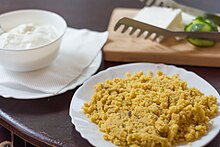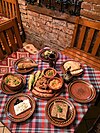Kačamak
 Prepared Kačamak in traditional restaurant in Trnica, North Macedonia | |
| Alternative names | Kachamak, pura, bakrdan |
|---|---|
| Type | Pudding |
| Place of origin | Bosnia and Herzegovina |
| Region or state | Balkans |
| Main ingredients | Cornmeal |
Kačamak (Cyrillic: качамак; Albanian: Kaçamaku), also known as pura (Cyrillic: пура), is a kind of maize porridge made in the Balkans. Its name is derived from the Turkish word kaçamak, meaning escapade. It is also known as bakrdan (бакрдан) in North Macedonia.
History
The dish is made of cornmeal. Potatoes, white cheese or kaymak are sometimes added. Similar to the Abkhazian abısta, Adyghe mamıs, Italian polenta and Romanian mămăligă, it is prepared by boiling cornmeal and then mashing it while the pot is still on the stove. It was once regarded as a poor man's food, but now is widely eaten, including in restaurants.
Serving
In Bulgaria, it is traditionally served with heated lard or sunflower oil with small amounts of browned paprika or hot pepper. Often cracklings or sirene are added.
In Montenegro, Albania and Herzegovina kačamak is also prepared with crushed potatoes and cheese until a thick mass is formed.[1]
In Central Serbia, it is prepared with finer grains of white cornmeal, served with white cheese and kajmak.[2] It is usually served with minced meat roasted in butter, boiled grape juice, milk, plain yogurt, honey, sour cream, or sometimes with bacon.
References
- ^ "Kacamak With Potatoes and Cheese (Bosnia Herzegovina)". Food.com. Retrieved 17 December 2015.
- ^ "The Serbian hominy – Mush (Srpski kačamak, kulja, pura)". The Serbian Cookbook. Retrieved 17 December 2015.

